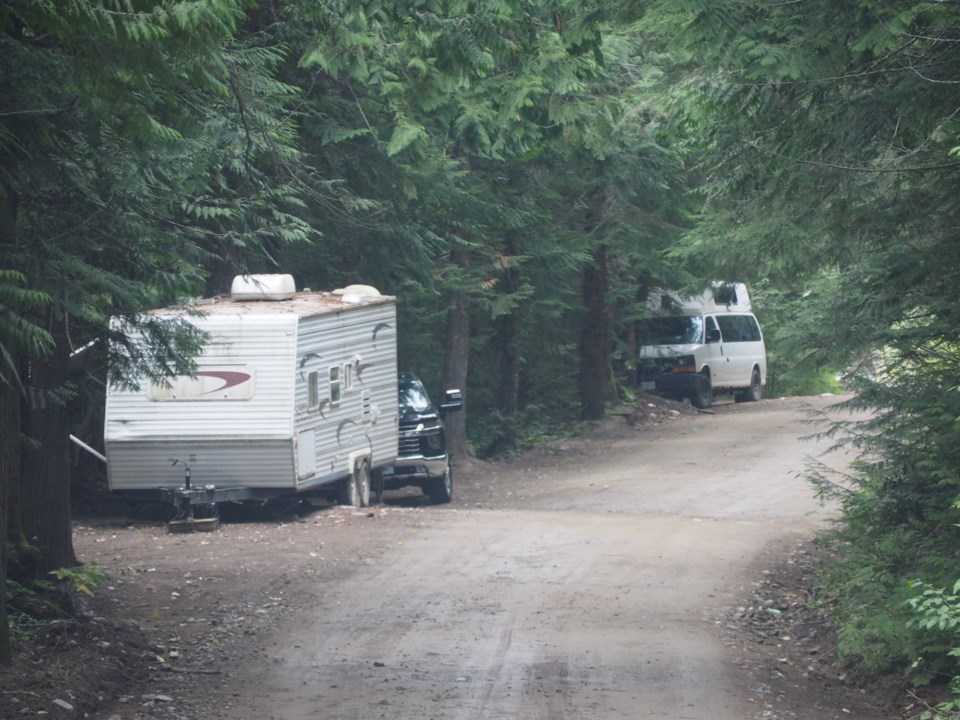One of Whistler’s favourite pieces of recent local lore is the story of former Mayor Nancy Wilhelm-Morden’s early days in the resort.
As has been told over and again, Wilhelm-Morden and her partner Ted were once squatters in the valley in the mid-1970s.
In the fall of 1975, the couple built a cabin in the woods by Crabapple Creek, near Brio—partially due to the housing crunch of the day.
“It was a good location,” Ted told Pique in 2020. “The kind of land that would fetch a million bucks these days.”
But it was entirely Ted’s idea, Nancy added.
“I remember thinking, we’re absolutely nuts, going to live in the middle of the bush, with no hydro and no toilet and no shower,” she said.
Squatting and camping in the areas around Whistler is nothing new, but there are (anecdotally at least) a lot more people living rough on the resort’s outskirts this year.
At the July 23 council meeting, Councillor Ralph Forsyth described it as “a serious problem at both ends.
“We have it at Wedge where there’s basically near lawlessness, and at Cheakamus which is adjacent to one of our neighbourhoods,” he said. “What can we do to signal to the ministry as urgently as possible that something needs to be done?”
Staff’s response could be summarized as: not much.
Photos sent to Pique and posted on social media in recent weeks show the problem isn’t going away—and in fact looks more permanent than ever, with people digging in for the long-haul.
But as Mayor Jack Crompton made clear at the July 23 council meeting, it’s not the Resort Municipality of Whistler’s (RMOW) jurisdiction to enforce.
“I think it’s really important that we acknowledge whose jurisdiction this is, and not give anybody in this community the sense that we have the tools to fix this,” Crompton said.
“We do not have the tools, we do not have the jurisdiction.”
According to the provincial Ministry of Forests, people in B.C. are allowed to camp on Crown land in one location for up to 14 days, “if they are not violating natural resource laws. We ask campers to use a ‘leave no trace’ ethic and respect other people and wildlife,” a spokesperson said.
“When needed, natural resource sector enforcement officers, such as Natural Resource Officers (NROs) and Conservation Officers, collaborate with cross-government partners in coordinated responses to encampment situations. This includes any fire risk on Crown land, which can be reported through the Provincial RAPP complaints line: 1-877-952-7277 (1-877-952-RAPP).”
The province manages Crown land for the people of B.C., and works hard to ensure it is used responsibly, the spokesperson added.
“Keeping people safe is our first priority,” they said.
In a follow-up statement to Pique on Aug. 20, Crompton noted council has received a number of letters from concerned citizens regarding the increase in illegal camping on both Cheakamus Lake Forest Service Road, and at the entrance to Wedge Creek Forest Service Road, both on unceded territories and under the jurisdiction of the province.
“The municipality is advocating for provincial support in moving campers along and minimizing hazards,” Crompton said, adding last week, Whistler’s fire chief wrote to the BC Office of the Fire Commissioner requesting partnership to manage the situation.
“I have spoken to my contacts at the province including the Minister of Tourism. I have prepared a letter to provincial authorities to ask for enforcement of the regulations placing limits on camping and supporting safe use of outdoor space. The letter stresses the urgency of the situation and requests action,” the mayor said.
“This is not just a problem in the Sea to Sky, it is an issue faced around the province. Council is attending UBCM in September and will be discussing solutions with other councils and with our provincial counterparts.”
We can’t assume what circumstances led any particular individual to their current lot in life. It could be related to addiction or trauma, or even a nasty injury keeping someone from working.
Or it could just be they don’t want to pay the downright criminal rental rates being asked by some landlords in Whistler, Pemberton and Squamish, and who could possibly blame them?
Maybe they just don’t want to share a room, apartment, or even house with three or more strangers.
The RMOW’s own projections show the potential breadth of this problem in the years to come.
According to the Balance Model Initiative, as population in the Lower Mainland grows, and more people fly into YVR, visitation to Whistler, historically, has grown right alongside it. For every 100,000-person increase in the Lower Mainland, Whistler sees an additional 400 daily visitors, according to the RMOW’s analysis.
Metro Vancouver’s population was about 2.8 million in 2021. Recent modelling done by the Metro Vancouver Regional District predicts that number will grow to 3.8 million by 2050.
So that extra million people could, in theory at least, equate to 4,000 extra daily visitors to Whistler by 2050.
And according to the RMOW, for every 1,000 daily visitors, we need 600 workers to serve them—so tack on 2,400 more employees living locally.
These equations don’t even factor in arrivals to YVR. For every additional 1 million arrivals, Whistler has typically seen 300 additional daily destination visitors, according to the RMOW.
So while it is great that we’re building housing, it will never be enough.
Whatever the solution ends up being, at the end of the day, we have to remember these are people first and foremost, and housing costs and affordability are out of control everywhere.
Who is to say a future mayor of Whistler isn’t currently squatting in the woods? (Which is a funny sentence to both imagine and type—but it’s true!)
The sanitary and fire risks are real. But we need to keep compassion front and centre as we search for solutions that work for everybody.




